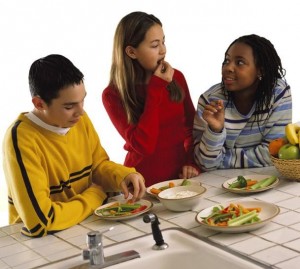Help Wanted: Veggie Teens in Need of Support
Melanie Wilson and I have come into contact with hundreds of veggie teens whose support systems range in size from no one to entire communities. The most mind boggling situations, however, involve parents so opposed to vegetarianism they stop buying food for their child. I was surprised to see how many challenges these teens and preteens are facing with regard to their diets; conflicts with parents, teachers, administration, little to no healthy veggie options, reprimands, and outright manipulation. Unless we have teens in our daily lives, it is difficult to truly understand their plight. Vegetarian teens, especially those with parents dedicated to the standard American diet, are up against as many challenges as you might expect…and then some.
First of all, their bodies and minds tell them they should be able to make their own decisions. They have more freedom and independence than in previous years, but they still live in their parents’ homes under their parents’ roofs with their parents’ rules. Sadly, many of these well-meaning parents believe the marketing ploys of the slaughtering industries; that their children must eat and drink flesh products in order to be healthy and develop properly. Parents often believe the reasons for being vegetarian stem from naïveté and the entire diet is a passing phase. This is especially true when it comes to animal rights; one of the most frequently given reasons for vegetarianism among the teens I’ve met. For many, they are in early puberty and have a long time before they can make their own decisions and run their own vegetarian households. In the meantime, they are at the mercy of their parents.
As one visitor on the vegetarianteen.com message board wrote, “I am a pesco vegetarian and I know that some people feel that this type of diet is not really vegetarian, because fish does have a face, and is an animal, and is killed. However, I would like to respond that people should not judge me by that fact, because I hate to eat fish. My mother is ‘protein-phobic’ and won’t let me go off fish. She serves it. I leave it on the plate. She yells and makes me eat it. So, I gulp it down and then gag. I try to make her understand why I don’t want to eat it, but she won’t listen. No one else in my family is vegetarian at all. Please take into consideration that some people don’t have a choice but to be pesco- or pollo- vegetarian, so don’t automatically assume that these people are cheaters or not truly supporting the animal cruelty cause, until you know their side of the story.”
This is where we come in. One of my favorite things about the vegetarian community is the unusual generosity and compassion that permeates from within. Extending this to the disenfranchised veggie teen and their parents could very well make the difference. However, it is important not to undermine the parents’ authority, but instead to understand that they are, for the most part, genuinely concerned for their child’s welfare even if they are misinformed. There are many ways you can help veggie teens continue to express their values through their diet.
The following is a list of suggestions that do not require direct interaction between you and the veggie teen or his/her parents:
- Donate veggie publications/journals/books to local libraries; public libraries, school libraries, etc
- Join the campaign to get healthy lunches in local schools.
- Request vegan options at local restaurants.
- Let vegetarian-friendly companies know what you like about the company and encourage them to continue.
The following is a list of strategies to directly help a veggie teen without entering into mortal combat with the parents:
- Live the life. Set a positive example without proselytizing or attacking. When put on the defensive, people tend to focus on protecting their views rather than reexamining their position.
- Arm yourself with as much nutritional information regarding teens as possible. This will prepare you to offer positive information in support of the teen’s diet.
- Listen to the parents’ concerns without advising. There is plenty of time to give them information. Once they feel heard, they may be more likely to listen.
- Reexamine your transition to a plant-based diet. Why did you do it? What ideas helped you make the decision? Gently communicate that with concerned parents.
- Invite the family over for dinner. Let them go at their own pace and try new things when they are ready. The idea is to help them progress without pushing. Please avoid tricking them into eating veggie alternatives. Doing so could undermine their trust.
- Learn about the hot topics/anti-veggie propaganda and be prepared to calmly discuss them. Leave the emotions at home and do your best to keep a cool head.
- Give the parents vegan information from reliable, respected sources that focus on the parents’ issues of concern.
My hope is that this will spark some creative thinking because there are countless ways to promote vegetarianism that will trickle down and eventually help the veggie teen. In fact, just knowing the rest of the vegetarian community supports their decision to follow a plant-based diet helps them face their daily struggles with more confidence. Many of them need some extra help though. I encourage each of you to take one positive step in that direction. It will make a difference.


